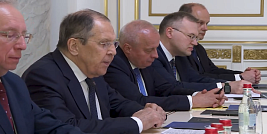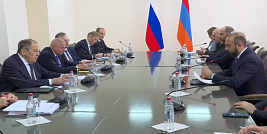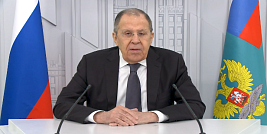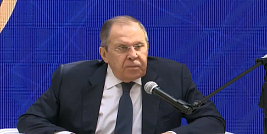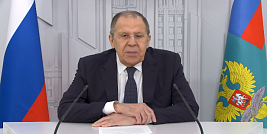Talking points of the Permanent Representative of the Russian Federation to the United Nations Office and other International Organizations in Geneva Gennady Gatilov at a press-conference following the BTWC Ninth Review Conference, Geneva, December 16, 2022
Good afternoon, colleagues,
Today, the Ninth Biological and Toxin Weapons Convention (BTWC) Review Conference is coming to end. Taking into account that such events are taking place every five years (in our case, there was a one-year delay due to the COVID-19 pandemic), their significance, in terms of implementation of the Convention, can hardly be overestimated.
In line with Article 12 of the BTWC, at such meetings States Parties review implementation of the Convention in order to ensure that its purposes and provisions are being properly implemented. In this regard, at the current RevCon, delegations reviewed implementation of the document to identify gaps, analyzed it article by article, drafted decisions and recommendations for further universalization and strengthening of the BTWC regime, and outlined priorities for the new review cycle.
We view the BTWC as one of the pillars of international security architecture, moreover, Russia, as one of the depositary States of the Convention, is fully committed to fulfilling its obligations. Today, as 50 years ago, when it was opened for signature in 1972, the goal of the Convention remains highly relevant and is aimed at completely eliminating the possibility of biological agents being used as weapons. The BTWC, along with its benefits and an integral role it plays, has a significant potential for strengthening.
In recent years, life itself has reaffirmed the relevance and significance of this international legal instrument. Not long ago, have we witnessed an outbreak of an infectious disease that had dramatically turned into a pandemic. Given its impact on the global community and international relations as a whole, it is hard to imagine how pathogens may affect us if used as weapons.
At the same time, we have every reason to state that biological weapons and their components have been developed in close proximity to Russia's borders. In particular, we are witnessing relevant biological and military activities carried out by the United States and its allies outside national territories, including in the post-Soviet States. Military agencies and their private contractors are engaged in such activities.
Such activities include collection of information on infectious diseases, export of biological samples and national collections containing pathogens, analysis of pathogens of highly dangerous infections (including vaccine-resistant), as well as of transmitters of highly dangerous and economically significant infections. At the same time, information on this allegedly peaceful activities is restricted and funded by the military of third countries. Moreover, foreign military experts are directly engaged in certain projects. Military and biological activities carried out by Washington and Kiev in laboratories on the territory under Ukrainian control is a flagrant example in this context.
We have reiterated our position on this issue over the previous few weeks of the current Review Conference. We have stressed that the Russian Federation will in no way agree to any activities associated with pathogens and transmitters of highly dangerous infections by foreign military agencies in close proximity to Russia's borders. We have emphasized that we view it as a threat to our national security.
We also noted that the countries engaged in such activities do not provide any information under BTWC confidence-building measures drafted by the States Parties "in order to prevent or reduce the occurrence of ambiguities, doubts and suspicions" and to improve international cooperation on peaceful biological activity. We can not force them to do so due to the absence of a legally binding protocol with an effective verification mechanism under BTWC. What is especially cynical is that it is exactly the United States who has been blocking any attempts to resume negotiations on this document since 2001. At the Ninth Review Conference, the United States and its allies did the utmost to prevent any further consideration of the issues associated with their military and biological activities carried out beyond national territories (including, in close proximity to Russia's borders) contrary to the BTWC.
Russia made every effort to present to the States Parties credible information on such activities by the West. We have briefed on the outcomes of the consultative meeting convened by Russia this September in line with Article 5 of BTWC in order to clarify the details of military and biological activities in Ukraine. Our experts have again, as they did in September, presented on multiple occasions detailed information which shed light on the nature of the activities carried out in violation of BTWC. They posed clear professional questions, but did not receive substantial answers.
We informed on our initiative to convene a Security Council meeting in October to launch an investigation process in line with Article 6 of BTWC. However, the Russian draft resolution on establishing an appropriate international commission was immediately denied by the United States and its allies.
Despite any determination of the West to hush up this vital BTWC issue, this won't work out. We will continue seeking answers to the outstanding issues and questions. We will continue urging the United States and Ukraine to settle this unacceptable situation undermining implementation of the Convention.
Throughout the BTWC Review Conference, we have consistently insisted that such a situation requires urgent solutions to strengthen the BTWC in order to have effective mechanisms to address such difficulties and prevent them in the future. Along with the vast majority of the States Parties, Russia is convinced that the Convention would be strengthened in case a universal, legally binding, nondiscriminatory protocol covering all Articles of the Convention and having an effective verification mechanism is adopted. As I have already mentioned, the United States continues blocking this idea.
We also pointed to the need to improve the BTWC confidence-building measures. In particular, we suggested including in the current reporting forms information on military and biological activities of the States Parties beyond national territories in order to address any concerns with regard to such activities. Despite huge support by a vast majority of the BTWC States Parties, mainly by the NAM States, this initiative has so far faced strong resistance from a narrow group of Western States.
Moreover, at this Review Conference, together with the experts from the relevant ministries and agencies, we have presented a number of specific initiatives aimed at strengthening the Convention. These include establishing an Open-ended Working Group to develop measures and proposals to strengthen the BTWC, creating mobile bio-medical units under the Convention to assist in case of use of biological weapons and in combating infectious diseases of various origins, establishing a mechanism to investigate alleged violation of BTWC obligations under its Article 6, and establishing a Scientific Advisory Committee to assess achievements in science and technology relevant to the Convention and to make recommendations to the States Parties. Many States Parties expressed their support, these were mainly the NAM States, but the Western countries denied them for purely political reasons.
At the Review Conference side events, the Russian delegation also presented its position in terms of cooperation with other States Parties under Article 10. Together with Rospotrebnadzor, we have organized an exhibition on Russia's achievements in ensuring sanitary and epidemiological well-being.
We hope that within a few hours left before the Review Conference ends up, common sense will prevail and the Western States will stop undermining the BTWC in order to suit their own interests. There is still a chance to agree on mutually acceptable solutions and adopt specific decisions to institutionalize the Convention and lay a foundation for fruitful work under the new review cycle. We are hopeful that the United States and its allies will show genuine signs of wisdom.
It is our view that this Review Conference will make it possible to bring the international community together around a pragmatic, non-discriminatory and future-oriented agenda. We share a common goal, to strengthen a biological weapons regime and develop cooperation for peaceful purposes. Russia continues calling on all stakeholders to unite in constructive efforts for the sake of strengthening international security and in the interests of arms control, disarmament and non-proliferation.
